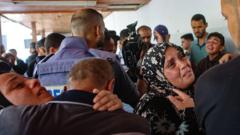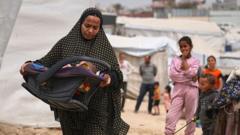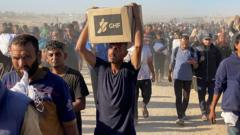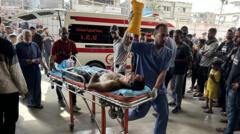The ongoing humanitarian crisis in Gaza intensifies as aid distribution centres are ordered to cease operations, following deadly clashes. The Israeli Defense Forces (IDF) issued a warning designating roads to these centres as "combat zones," exacerbating an already dire situation for Gazans reliant on aid.
IDF Declares Roads to Gaza Aid Centres 'Combat Zones', Halting Aid Distribution
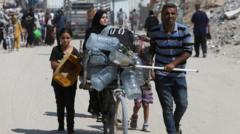
IDF Declares Roads to Gaza Aid Centres 'Combat Zones', Halting Aid Distribution
Aid distribution centres in Gaza will temporarily close as IDF designates access routes as dangerous; backlash grows against new aid model.
The Gaza Humanitarian Foundation (GHF), a newly established aid network receiving backing from the United States and Israel, announced the suspension of aid distribution slated for Wednesday. The closure was said to be for "update, organization and efficiency improvements works," but came on the heels of increased tensions following the tragic deaths of at least 27 Palestinians due to Israeli fire near one of the centres. According to IDF reports, troops fired upon individuals they identified as deviating from pre-approved access routes.
This marks the third fatal incident in recent days tied to travel to a GHF site, further raising alarms among humanitarian organizations about the sustainability and safety of aid access in Gaza. GHF indicates that operations will resume on Thursday, but the alarming nature of these incidents casts doubt on the security of cardholders and the effectiveness of the new aid distribution model.
Previously, the GHF aimed at succeeding the UN-led network, following repeated allegations from Israel that UN efforts were being compromised by contributions to Hamas. These accusations have been vehemently denied by UN representatives. The GHF's distribution approach necessitates that residents pick up supplies from limited centres located within areas controlled by Israeli forces. Critics have voiced concern that this model imposes substantial hardships on residents, who must traverse long distances and carry heavy supplies.
The controversy intensified with the appointment of Reverend Dr. Johnnie Moore, a prominent evangelical pastor, as the new head of GHF. Moore replaces former chief Jake Wood, who stepped down amidst disapproval of the new distribution system. This comes at a time when the humanitarian landscape continues to deteriorate, with significant shortages of basic necessities such as food and clean water reported in Gaza.
Since the outbreak of conflict tied to Hamas' cross-border assault on October 7, which resulted in considerable loss of life and hostage situations, the civilian toll in Gaza has compounded significantly, with over 54,000 casualties recorded since the onset of hostilities.
As humanitarian agencies call on GHF to uphold essential humanitarian principles amidst this crisis, the challenges faced by Gazans highlight the urgent need for a reassessment of the distribution strategies employed in conflict zones.
This marks the third fatal incident in recent days tied to travel to a GHF site, further raising alarms among humanitarian organizations about the sustainability and safety of aid access in Gaza. GHF indicates that operations will resume on Thursday, but the alarming nature of these incidents casts doubt on the security of cardholders and the effectiveness of the new aid distribution model.
Previously, the GHF aimed at succeeding the UN-led network, following repeated allegations from Israel that UN efforts were being compromised by contributions to Hamas. These accusations have been vehemently denied by UN representatives. The GHF's distribution approach necessitates that residents pick up supplies from limited centres located within areas controlled by Israeli forces. Critics have voiced concern that this model imposes substantial hardships on residents, who must traverse long distances and carry heavy supplies.
The controversy intensified with the appointment of Reverend Dr. Johnnie Moore, a prominent evangelical pastor, as the new head of GHF. Moore replaces former chief Jake Wood, who stepped down amidst disapproval of the new distribution system. This comes at a time when the humanitarian landscape continues to deteriorate, with significant shortages of basic necessities such as food and clean water reported in Gaza.
Since the outbreak of conflict tied to Hamas' cross-border assault on October 7, which resulted in considerable loss of life and hostage situations, the civilian toll in Gaza has compounded significantly, with over 54,000 casualties recorded since the onset of hostilities.
As humanitarian agencies call on GHF to uphold essential humanitarian principles amidst this crisis, the challenges faced by Gazans highlight the urgent need for a reassessment of the distribution strategies employed in conflict zones.


